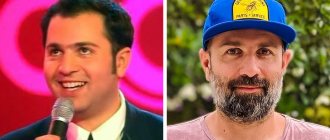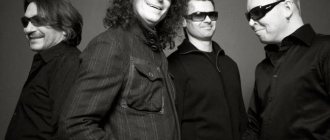Childhood and youth
Sergei Vladimirovich Mazaev was born in Moscow on December 7, 1959. The boy's parents divorced when he was barely 4 months old. Soon Seryozha’s mother remarried, and he moved in with his grandmother.
Mazaev studied at school with a physics and mathematics focus, but showed interest in creativity since childhood. Sergei began studying music - vocals and wind instruments, clarinet and saxophone - at the age of 11.
View this post on Instagram
A post shared by Sergey Mazaev (@sergeymazaev_official) on Jun 17, 2020 at 12:27am PDT
Singer Sergei Mazaev
Mazaev graduated from the Ippolitov-Ivanov Music School in clarinet class. Then the young man continued his studies in music at the Gnessin Institute.
Sergei Mazaev served honorably in the ranks of the Soviet army. During his service, he ended up in a musical company and joined the Zhukovsky VIA. The musician took part in three Victory Day parades on Red Square as part of the combined military orchestra of the Moscow garrison.
After returning from the army, the guy doubted his musical career and decided to get a higher education in a more mundane profession. Sergei entered Moscow State University at the Faculty of Economics, but did not finish his studies: he still preferred music and went to the stage.
Why is grandfather Mazai?
N.A. Nekrasov, in addition to being an outstanding poet, turned out to be an equally talented publisher. In 1846 he bought the Sovremennik magazine. The publication of this magazine was started by A.S. Pushkin, but during the ten years of its existence, Sovremennik did not bring any profit to the owners. Thanks to the works of N. A. Nekrasov, in a short time Sovremennik became the most popular (and, therefore, the most profitable) magazine in Russia at that time.
And not only because the most talented writers were involved in the collaboration. At the same time as taking care of the quality content of N.A.’s rooms. Nekrasov opened a wide circle of new, “his” readers. The magazine spoke to these readers in their language and did not hesitate to discuss “hot” topics for them. Hence the amazing popularity and even cult following.
It cannot be said that Nekrasov wrote to order, but he sensed the so-called “social order”. As an experienced and successful gambler (which, by the way, Nikolai Alekseevich was), seeing that “the card had gone,” he skillfully used the opportunity to hit the jackpot. Accusatory poems about the hard lot of the Russian peasant sold like hot cakes, forcing readers to forget that they were written by a feudal landowner with a spirit that was not at all liberal.
It is not difficult for me and my contemporaries to imagine why and how the popularity of Nekrasov’s Sovremennik grew. In our memory, in the late 1980s, the magazine Ogonyok made a similar somersault when V. Korotich became its editor.
With the “superior instinct” of a gambler, hunter and journalist, poet N. A. Nekrasov discovered another “his” reader. Children's literature as such did not exist in Russia at that time, but, naturally, there were children. And Nekrasov began to write poetry for children. Of several such poems, the story about how Grandfather Mazai saved hares is the best.
As we see, the poet-hunter made no mistake in this matter either. The poem about Grandfather Mazai has been read to Russian children by their parents, educators and teachers for one hundred and fifty years. That is why, among the heroes of Russian literature, old Mazai ranks second in popularity, and if he ever gives way to Cheburashka.
The internal rhyme in the title “Grandfather MaZAY and the Hares” makes you think that this story was invented by the poet from beginning to end, and Mazay is a fictional character. But non-krasologists argue that this is not so. N.A. Nekrasov described the true incident.
Let's start with the scene of action, which is mentioned already in the first lines of the poem:
In August, near Malye Vezhi, I killed great snipes with old Mazai.
The great snipe is a small wading bird similar to the snipe. And Malye Vezhi is a village not far from Kostroma. From here to the estate of N.A. Nekrasov in Karabikha is 60 kilometers, but for a hunter this is not a detour. So the poet visited Malye Vezhi more than once.
The village was located between the Volga and Kostroma rivers. The place is low-lying, and every spring it was flooded by the spring flood. To escape from floods, villages here were built on hills. Small Vezhi were also crowded on the hill. They were crowded because there was little space on the hill. And since the flood sometimes covered the hill, the houses here were placed on pillars. What is also written about in the poem:
All of it is drowned in green gardens; The houses in it are on high pillars.
The spring inconveniences during the flood paid off handsomely in the summer. Tall grass grew in the flooded meadows. In addition, until the hottest season, there were many lakes teeming with fish in the floodplain. Local residents not only fed themselves with this fish, but also traded it in Kostroma. And there were plenty of swamps with great snipes and snipes in the area of the village where Mazai lived. No wonder N. A. Nekrasov came here to hunt!
Now there are no Small Vezhs. The entire low-lying part between the Kostroma River and the Volga was flooded in 1955 by the Gorky Reservoir, formed as a result of the construction of the Gorky Hydroelectric Power Station. The villagers moved to the neighboring village of Spas.
Now about the main character. N.A. Nekrasov, visiting these regions, hunted more than once with a resident of Malye Vezh, Ivan Savvich Mazaikhin . He was born in 1801 and died sometime in the 1860s. So during meetings with Nekrasov, his village nickname, “Grandfather Mazai,” was quite true: he was a grandfather.
However, one should not trust the poet recklessly. According to N.A. Nekrasov, Mazai is lonely, only his little grandson lives with him. The real I. S. Mazaikhin had a large family: two sons and many grandchildren. His descendants lived in the village until the flooding in the 1950s. The two-story house of the Mazaikhins was considered a local landmark.
What about the last name? Where did she come from, so wonderful? It turns out, from the neighboring people, from the Mordovians. In Mordovian, smudged means beautiful. There is even a Mordovian proper name “Mazai”, “handsome”. From this name came both the Mazaikhin surname and another common Russian surname, Mazaev.
Tags: word formation, biographies, poets, poetry, poems, interesting fact, content, salvation, history, Nikolai Nekrasov
Creation
In 1979, Mazaev first appeared on movie screens. The musician played a saxophonist in the Astoria restaurant in the film “The Meeting Place Cannot Be Changed” by Stanislav Govorukhin.
View this post on Instagram
A post shared by Sergey Mazaev (@sergeymazaev_official) on Dec 7, 2020 at 11:46am PST
In the 80s, Sergei Mazaev focused on his musical career and began collaborating with musical groups. Together with the Soviet rock band "Autograph", he recorded two albums - "Stone Edge" and Tear Down the Border.
In 1989, the musician joined the Moral Code group, in which he took the place of lead singer. It was put together by the poet and composer Pavel Zhagun, who dreamed of a rock band with philosophical and at the same time witty lyrics.
The group's debut music video for the song “I Love You” was aired on the Morning Mail program on July 11, 1990. In December of the same year, the musicians released their second video for the song “Goodbye, Mom!” and gain popularity among television viewers.
In 1993, the group members changed their image and got rid of long hair and dark glasses. In 1995, “Moral Code” participated in the first music festival “Maxidrom”. In the same year, the actor plays a minor role in the musical film “Old Songs about the Main Thing.”
In 1996, the group released the long-awaited second album, “Flexible Stan,” and the third album, “I Choose You,” was released in 1997. The musicians are putting together an album from materials, some of which were prepared for Flexible Mill.
For the next 3 years, the artists record new songs with a long break. In 2001, the group's fourth album, Good News, was released. The album is released on the Real Records label.
In 2002, the artist first appeared on screen in the leading role in the social drama “Kopeyka” directed by Ivan Dykhovichny and written by Vladimir Sorokin. The film also featured a song performed by Mazaev - the composition “I love you to tears.”
Sergey Mazaev and Natalya Vetlitskaya
In 2006, Mazaev continued his acting career. With his participation, such projects as “Carnival Night - 2, or 50 years later”, “Open, Santa Claus!”, “Radio Day”, “Inhabited Island” and “Stepanych’s Mexican Voyage” were released.
In 2007, the discography of the “Moral Code” was replenished with the album “Slavic Dances”, and in 2008 - with the collection “Where are you?”
Sergei Mazaev often performs in collaboration with other musicians. He recorded songs with Brigade S and Alexander Barykin, collaborated with Igor Butman and Natalya Vetlitskaya, and developed related jazz projects together with Yuri Tsaler, Igor Matvienko, Konstantin Smirnov and the Ivanov brothers. The singer also acts as the artistic director of a pop orchestra.
Mazaev's first successes
In 1986, today's birthday boy joined the musical group "Autograph", which performed progressive rock. The group was incredibly popular both in the Soviet Union and far beyond its borders. Mazaev worked as a member of “Autograph” for 3 years, after which he moved to the newly created group “Moral Code”. The musicians of this band play rock, boldly combining it with blues, jazz and funk.
To date, members of the “Moral Code” have recorded and presented 6 studio albums, the last of which appeared in 2014. Sergei Mazaev performed absolutely all the compositions of this popular group and took part in all the group’s videos. Many songs have gained wide popularity, among them: “Goodbye, Mom”, “I feel good with you”, “Night whim” and “Paradise Lost”.
During his creative activity, the musician toured not only all post-Soviet states, but also many other countries. “Moral Code” has become the favorite group of a multi-million army of fans and has not given up its position for many years.
Personal life
Almost nothing is known about the musician’s first wife. Olga was a housemate. The relationship between the young people began after Sergei returned from the army. The guy was already building a musical career at that time; he had plans to move to Europe. He was going to take his wife and child there, but the woman filed for divorce, unable to bear her husband’s riotous lifestyle.
View this post on Instagram
A post shared by Sergey Mazaev (@sergeymazaev_official) on Sep 20, 2020 at 12:26am PDT
Sergei Mazaev with his wife Galina Mazaeva
From his first marriage, Sergei Mazaev has an adult son, Ilya. He chose a scientific career; after graduating from Moscow State University, he worked for a time at a research institute, then got a position at the Institute of Economics. Genes made themselves felt in the life of the young scientist. Ilya started out as a musician in the band Rates of Exchange. Now he works as a sound engineer and sometimes writes songs for his father.
Sergei’s second wife was journalist Galina, who is 18 years younger than the musician. Due to the nature of the musician’s activities, the spouses do not feel the age difference. Today Galina Mazaeva holds the position of senior editor of the GQ lifestyle department. The musician’s family has two common children: the eldest daughter Anya and the youngest Peter, who was born in 2009.
Anna is studying at the British School of Design, but does not exclude the possibility that she will continue the musical dynasty. The Mazaevs love to spend their free time in Zhukovka near Moscow and in Italy, where they rent apartments in Forte dei Marmi. Photos from the holiday periodically appear on the page of Sergei’s official group on Instagram.
View this post on Instagram
A post shared by Sergey Mazaev (@sergeymazaev_official) on Nov 7, 2020 at 10:25pm PST
Sergey Mazaev with his son
The musician calls Natalya Vetlitskaya and Alena Sviridova his friends. Out of friendship, Sviridova even gave Mazaev an old Cadillac, which the singer restored and made his main means of transportation.
In May 2020, Mazaev took part in the TV show “The Invisible Man,” hosted by Evelina Bledans. The musician shared with TV viewers details of his personal life and unpublicized past. Sergei talked about how he led a murderous rock and roll lifestyle in his youth, why he gave it up, what threats to his life he faced, and why he feels guilty before his own son.
The artist is known as a big fan of shopping. As Sergei said on the air of the “Secret to a Million” program, he developed this hobby after he lost extra pounds. Today, with a height of 185 cm, his weight is 92 kg.
View this post on Instagram
A post shared by Sergey Mazaev (@sergeymazaev_official) on Apr 26, 2020 at 6:00am PDT
Sergey Mazaev with children
In a conversation with Lera Kudryavtseva, Mazaev revealed another secret about the birth of his illegitimate daughter Natalya. The singer had a passing passion with the girl’s mother. The woman did not immediately share the news about her pregnancy with the singer. After the birth of the child, the artist was able to participate in Natasha’s upbringing only financially. Now the girl lives in the USA, where she went to study.
Personal life of Sergei Mazaev
Sergei never talked much about his first chosen one; it is only known that from this marriage he has a son, Ilya.
Sergey Mazaev, his wife and children
The popular performer met his second wife at the peak of his career. Galina graduated from GITIS and later became a senior editor at GQ. She is 18 years younger than Sergei, but the age difference does not bother them in any way. The couple is raising a daughter, Anya, and a son, Petya.
Sergey Mazaev now
In 2020, Mazaev presented fans of his work with a new work - the album “Pictures at an Exhibition”, which he created together with the musicians of the instrumental ensemble QUEENtet after reading Sergei Fedyakin’s biographical book about Modest Mussorgsky.
The disc is the author's arrangement of the piano cycle of the same name by the Russian composer. The rock singer himself performs in the quintet as a clarinetist. On the eve of 2020, the musicians gave a concert in the Aptekarsky Ogorod greenhouse.
View this post on Instagram
A post shared by Sergey Mazaev (@sergeymazaev_official) on Oct 25, 2020 at 12:27am PDT
Sergey Mazaev in 2020
Another interesting experience for the musician was participation in the opera “Worker and Collective Farm Woman” by composer Vladimir Nikolaev, where Mazaev performed the role of Stalin. According to the artist, now he is more interested in classical music, but he also does not leave the rock band. Concerts featuring the “Moral Code” are held on stages in the capital.
Sergei Mazaev: “Among my colleagues, unfortunately, there are many lackeys”
Sergei Mazaev in an interview with AiF.ru spoke about why Deep Purple’s hit “Smoke on the water” is not popular in England, and oil is evil for Arabs, why corruption needs to be legalized, why Instagram is a “Chukchi production”, and the stage Shnurov’s image is lumpen and how the “Moral Code”, celebrating its 30th anniversary, almost became the “Diamond Hand”.
Vladimir Polupanov, AiF.ru: In December you turned 60 years old. Is it difficult to play rock and roll at this age?
Sergey Mazaev: Of course, it’s hard. With the same fervor, I will no longer sing the song I'm Going. We need to seriously prepare. I have a baritone bass, and the song has a tenor range. I've been yelling at her all my life. And now I no longer have the strength to do this. You have to be in very good shape. We are forced to perform concerts until we are 70 years old, as if we are all 30, because we do not have a law on the protection of mechanical rights. Our songs are played by radio stations, they receive money for it, and we are forced to earn money through concerts.
Article on the topic
Sergey Mazaev: “Hear me, dear one”
Our copyright societies collect royalties for songwriters. But composing/coming up with a song is half the battle. Until a song is recorded, it does not exist, it is in the author’s head. It must be sung, played, recorded. This is the “body” of copyright. In some civilized countries, 90% of copyrights go to performers and only 10% to authors. And since we have no law, our musicians are poor. Our state should be interested in ensuring that all citizens have the most convenient conditions for prosperity. And then you can receive taxes from them. What can you get from a beggar except dandruff? People need to prosper, then they will be able to pay taxes.
— But at the same time, it cannot be said that sought-after singers and authors are in poverty here.
- I do not live in accordance with my status. Unfortunately, I have an apartment with only three rooms and a kitchenette. At the same time, I know how the owners of radio stations who play our songs live - they buy apartments and houses in Serebryany Bor. And this is after 3-4 years of operation of the radio station. In no other country in the world do station owners earn that kind of money. I have said many times that it is necessary to change the copyright law and introduce this concept into the Constitution. I met with responsible comrades. But it seems to me that they did not understand what I wanted to tell them. They probably have no time for this. They all feel uncomfortable now.
— Since we're talking about economics, I want to ask. Initially, the name of your group sounded like “Moral Code of the Builder of Capitalism.” Was there an ideological component to the fact that the word “capitalism” appeared in the title?
- Certainly. I studied political economy for a long time and realized that capitalism is production and trade. And socialism is distribution. What will you distribute if you haven’t produced anything? Therefore, socialism is one of the stages of development of capitalism. Today we see the beginnings of socialism in Norway and Sweden, where the level of GDP per capita is very high. Their energy resources are national property. And the same oil is produced by foreign companies - the best in this business. Everything is transparent there - you can track through the Internet portal: who, what, how much they extracted, how much money went to the treasury. And each citizen of the country receives approximately 4 thousand euros monthly from oil revenues. The same thing is happening in the UAE. But for the Arab world, this freebie is more evil than good.
— Why?
— As soon as the Arabs found oil in the late 50s and began to get rich, they became lazy. Where are the outstanding scientists, conductors, musicians, athletes? Where is the intelligence of the Arab world? They rolled back to another stage of evolutionary development.
Scientists invented everything, not religious leaders. Everything we have was created by science. And everything else is brakes. And religion is a brake. If these brakes did not exist, there would be no civilizational rollbacks. Why does religion exist in the 21st century? Because this is an incredibly profitable business...
We live like baboons in jungle paddocks because we have a limbic brain system. It seems like we are structured like people - we build airplanes, wear suits. But in fact, we are guided by animal instincts.
Article on the topic
History according to Mazaev. The leader of the "Moral Code" declared Hitler the winner
— What is the manifestation of the limbic system?
— The limbic system controls instincts. I turn what I want. Our paleocortex is responsible for this. And the frontal lobes are the brakes so that we remain human. In general, a person has three main desires: to get drunk, to reproduce and to dominate. People “get fat” in different ways, depending on their appetite. A large villa on Rublyovka is also a way to satisfy your appetite.
— But do you often perform at Rublyovka?
- We do this all the time. This is the majority of our income.
— Do you care who you perform for?
- Of course, it doesn’t matter. We play for the poor and the rich, for the communists and for the liberals. We entertain people. And social status and political beliefs do not matter during the concert. And I am a convinced supporter of objectivism according to Ayn Rand (the main position of objectivism according to Ayn Rand is that the goal of every person’s life is the pursuit of their own happiness. At the same time, the social system must ensure the individual rights of people, which is achieved by observing the principle of non-interference of the state in the economy - Ed.).
I understand that this sounds naive and childish. But as a former Marxist, I understand that Marx was wrong. All people are different, they cannot be equalized.
— But there was a lot of good in our Markist-Soviet past. Agree?
- Certainly. Everything human was cultivated in us. We were part of a single creative whole. They defeated fascism, flew into space, were the first to develop the supersonic passenger plane Tu-144... As long as I can remember as a child, we never divided people according to nationality: Jew, Armenian, Tatar, Russian. Nobody paid attention to what nationality you were.
The only trouble is that there were very stupid people in the Soviet leadership. Gorbachev was simply henpecked. Where could he have acquired knowledge - economic, political? Shtetl consciousness. Under such a leader, of course, the country was doomed. He did not have the knowledge to carry out reforms.
— Today, in your opinion, is it time for reform? Should the Constitution be amended?
- Certainly. I believe that corruption should be legalized in general.
— Like this?!
— People must pay tax on every bribe.
— Are you being ironic?
- No. Something similar exists in Switzerland. Therefore, there is no everyday corruption there, like here. I understand that Putin has found himself in a situation that cannot be overcome in any way. It can only be adjusted. And thus win. And for this it is necessary to legalize bribes. Let's say 12 billion rubles were found from FSB colonels. This is a gigantic amount, economically significant. You can raise an entire region with this money. This money would have gone somewhere. And so he accumulated them in one place, and, in fact, they returned to the treasury. Another thing is that he did not hand them over himself. But still, maybe we shouldn’t give him a long sentence. Maybe we'll leave him the apartment and say thank you.
Article on the topic
Sergei Mazaev: “It’s better for a musician to work for musicians, and not for miners or grain growers”
— For what?!
- For collecting a large amount and not spending it. Is it bad?
— Are you kidding?
- In no case. If you legalize corruption, the treasury will be replenished, and no one will have to be imprisoned. A person who receives a bribe must share with the state and give back a large part. Up to five thousand can be considered as a tip. There is no need to pay anything from this amount. Over 5 thousand - you pay 10%. If it’s 100 thousand, you already pay 50%. And from a billion and above you give up to 95% to the treasury. And you still have a lot left. But concealment should be severely punished and imprisoned. If such a law is introduced, then corrupt officials will not have to hide from anyone and the state will profit. All people will exhale. And we will all become one friendly family.
— Is it true that the idea of the Moral Code group originated with Pavel Zhagun?
— Initially he had a different idea. Pasha was going to create a group for export. Ivan Ivasivko , who also composed good lyrics, was considered as an English-speaking vocalist He lived in Canada, and the group was based in Moscow. During the same period, I left Autograph. We met with Pasha Zhagun in a cafe on Pokrovka, and I suggested: “Come on, maybe we’ll start some kind of rock and roll project?” He says: “And I already have a project called Red Barone & Heroes.” The music in that group was written by Sergei Zhelobetsky , Pasha’s friend and companion. By the way, Zhelobetsky is now a monk on Athos together with our drummer Igor Romashov , who is now Hieromonk Elijah (he is in good standing with the brethren, he produces honey).
Vocalist Ivan came from Canada to Moscow three times, 6 songs were recorded, very good, in my opinion, and two videos were shot. Maybe someday we will realize this music that never went anywhere. Then the Canadian soloist had difficulties coming to Russia. And while he was away, I suggested that the guys try to do something in Russian. And he joined the team as the third “shareholder”.
We gathered as a group in 1989, but the name “Moral Code” appeared in the fall of 1990. Our first broadcast was on July 12, 1990, under the name “The Diamond Arm.” But Gaidai’s film was too popular, and we abandoned this name. The first videos, the first recordings were made in the 90s. So the group was finally formed in 1990.
— Did you initially set out to play the uncompromising music you play today?
— We looked for a compromise and found it. They did not go into the traditional Jewish-Slavic stage with double dominants, which is played by the majority of our groups. Sort of country rock. A striking example is the Chaif group. This is a supergroup, but their style is Russian country rock. And we had a rock and roll vibe. We were brought up listening to Western rock music without knowing the language. They were loved for their music, emotions, hysteria. Because we didn't have it. And when they began to understand the texts, there was a terrible disappointment. Deep Purple's song "Smoke on the Water" is an everyday story about how the musicians came to Montreux to record an album in a mobile studio located in a casino. During a Frank Zappa , a fire broke out in a gambling establishment and it burned down. The Deep Purple musicians observed this fire from a hotel window on the other side of Lake Geneva and then described it in a song. But initially it seemed to me that the song contained a call to fight for justice, for peace in the whole world. The emotional intensity of the music does not match the words of the text. In England, by the way, this song is not particularly popular. Because the text is about nothing.
Article on the topic
Garik Sukachev: “I haven’t drunk for 30 years. But few people believe"
— Many world hits do not have the meaning that we originally put into them. Robert Plant himself said that Led Zeppelin's song "Stairway to Heaven" is "a cynical observation of a woman who constantly gets everything she wants without giving anything in return."
- Well, there is still some kind of philosophy in this song. In general, I was very impressed by my trip to America with Autograph. I bought a lot of CDs there: Bryan Ferry, INXS, David Bowie & Tin Machine, ZZ Top, Deep Purple, The Rolling Stones. Our music has it all.
Our whole stage is quite simple. The simpler the better (sings the song Laid Back - Ed.): “Give me, give me just a little smile.” Or (sings the song Ace of Base - Ed.): “All that she wants...” And we wanted to stand out. This is the main task of any product - to stand out from the mainstream so that people want to buy you.
— In order for people to want to buy you, you have to bend a lot. Are you capable of this?
- Of course not. Radio station owners talk to us through their lips and look down on us. They also take money from musicians to “help” get on the air. Of course, I don’t go to bow. That's why we are not in rotation on the radio.
— Have you always had problems with your radio? You weren't very popular in the 90s either?
- Yes. It's as if we don't exist. In 2014, our next album “Winter” was released. Apart from you and Bori Barabanov (Kommersant journalist - Ed.), no one noticed him. There are two of you who somehow mention the music of people of our generation. It’s about the music, and not about who has what kind of underwear and what it smells like.
Why are artists in the West so rich? Why are people there proud of their music awards? Because there laws protect musicians. And at our music awards, rich swindlers who have become billionaires hand out tchotchkes to those who come to bow to them. Among my colleagues, unfortunately, there are many lackeys. But I can't judge them for that. They also want to live like stars. But not lying to yourself and not giving in is much more valuable.
— What will happen at your anniversary concert on February 22 at Glavclub?
— We’ll play everything that can be played, old and new. Two hours of pure music.
— When can we expect a new album?
- He's hanging for now. Pavel Zhagun drags us, as it were, into the future. He offered 3 songs in a completely different vein. We have never performed such music. More like Depeche Mode than “Moral Code” - lots of electronics, few guitars. And we are already lazy old rhythm-blues players. Kildey (guitarist and songwriter of “Moral Code” Nikolai Devlet-Kildeev - Ed.) has nothing to play in these songs. Well, quite school music, in my opinion. But we will play a couple of new songs, although they are a little crooked and not hit at all. There will also be rare music that we usually don’t perform at concerts.
— One of the latest new songs is “Photons.” The idea of the song is that all people are buried in gadgets?
— This is exactly one of Pavel Zhagun’s new songs, which didn’t go well. She has no energy. And this topic doesn’t really suit me. “Your friends on Instagram are crazy about you.” It turns out that I’m some kind of old pedophile who is tormented by his unhappy love for a schoolgirl? Why am I singing this at all? I am a 60-year-old, happily married man. Pasha always managed to create very precise texts. But this time he overestimated me, it seems to me.
— Well, you sang it. And even Valeria Gai Germanika shot a video for this song.
- Yes, we implemented it so that there would be no talk that we were completely bronzed.
— Why don't you have a page on Instagram?
— I’m mainly on Facebook, there’s a lot of scientific stuff there that interests me. And there’s nothing on Instagram at all. What I see, I sing about. Chukchi production At the same time, everyone advises me: go ahead, get yourself an Instagram. People there make money from advertising. I won't be able to do this. I'm too old for this. My fans don't watch Instagram. There are different people there, a different generation. The same Shnurov was able to monetize it. But he is 14 years younger than me. A talented guy, very charismatic. And he turned out to be a good businessman.
— I agree, the guy is charismatic and smart. But music doesn't touch him at all. Not interested.
- What does this have to do with you and me? He does not write music for musicians and journalists. What he sings now is less interesting. This is already a pure business. But his first albums had the meaning: “I wish I could go to heaven.” He refined the aesthetic of Madness, Brigade C, but made it more cheeky. So this is all far from new. Even we tried to sing this - we had funny songs, like “Take care of x...”. The cord on stage definitely created the image of the very man who took power in our country in 1917, a kind of lumpen with the motto: “Get out the dirt, shit floats.”











